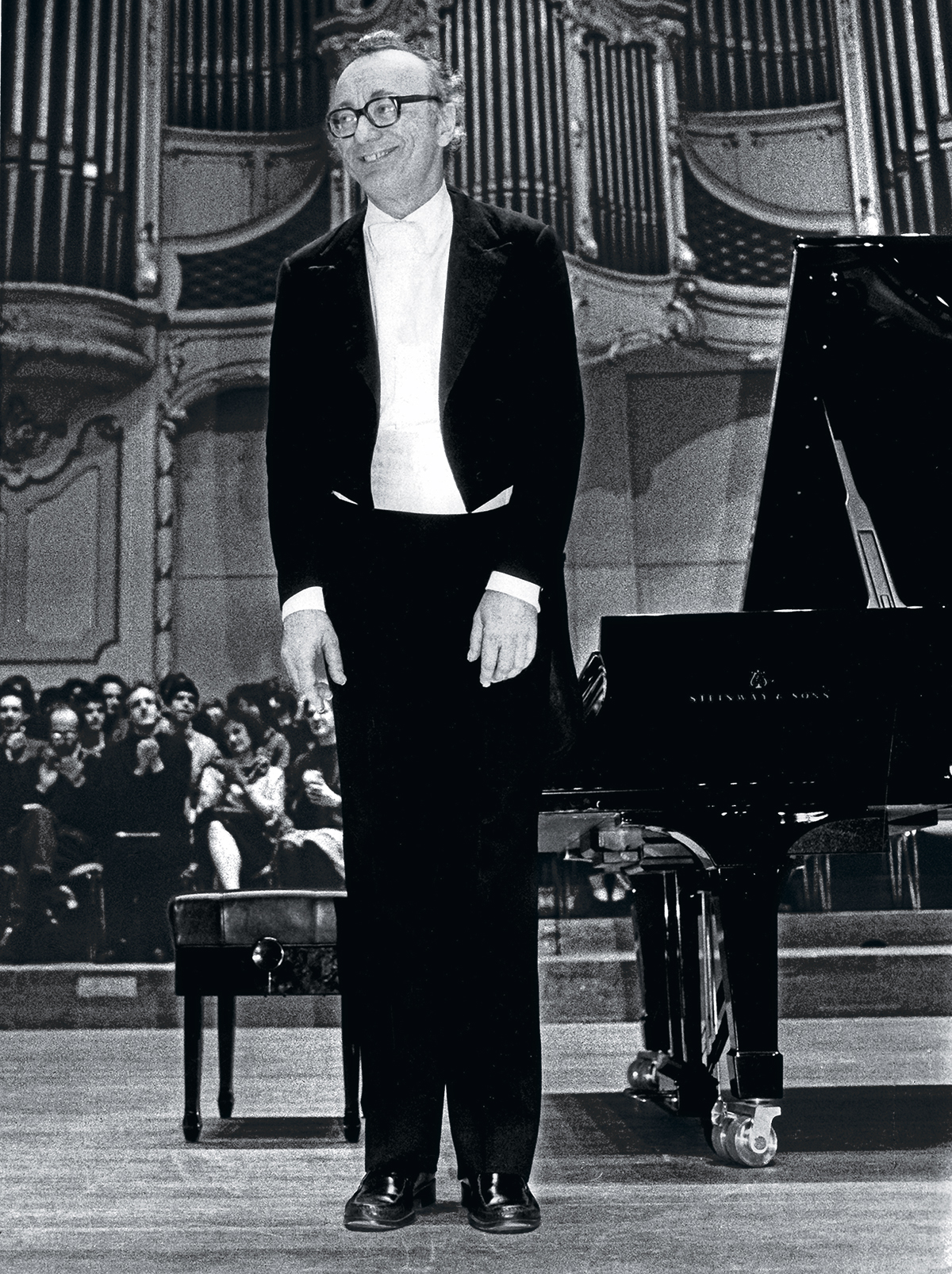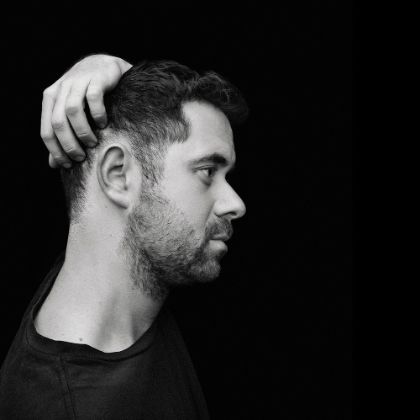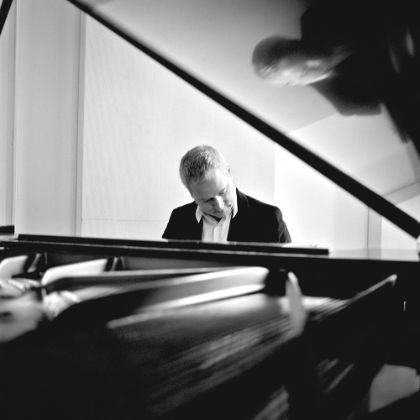listen magazine feature
Alfred Brendel:
The Thinking Pianist’s Man
Retired at Eighty-Five, and Still a Mire of Complexities
By Daniel Felsenfeld
“WHY SHOULD A musician with an active and absorbing career bother to write about matters of his trade?” writes Alfred Brendel in the preface to his essay collection Brendel on Music. “To explain himself is the least of his worries.” Here, contained within this chunk of modest introductory pith, we get a sense of the deep wryness and self-abnegating humor that serves as the gesso behind the full portrait of this enigmatic artist. For Brendel holds a likely never-to-be-repeated position in the music world: the dubious honor of being the “thinking man’s pianist,” perhaps the last of that specific breed. This uncertainty comes not from the built-in old-world sexism of the phrase but from the notion that such a thing is desired, necessary, and even exists at all. And yet Brendel, now eighty-five, earns this (un)fortunate moniker by dint of the vast corpus of his work: his prolific recorded output coupled with his distinguished literary contribution as both essayist and even poet. And though his mark has unquestionably been made, the man himself remains gnomic, elusive, not exactly a shut-in or a shut-out, absolutely famous but hardly a superstar.
‘Next to the wonderful sense of order I derived from music, I learned the value of nonsense.’
I admit a certain simpatico with Brendel: aside from sharing a birthday, we also share the great distinction of being mutants — musicians (classical musicians no less) from deeply unmusical families, and Brendel’s statement “next to my involvement with music, I have always been attracted by words,” can also apply to myself, as I’ve spent much of my time writing about music though trained and working as a composer. He even has more words about words which strike a resonant chord: “To use them with a modicum of elegance even when dealing with a subject which, supposedly, starts where words end, has remained a challenge.” I can attest he’s certainly risen to the challenge. But some shared pursuits aside, what attracts me to Brendel the pianist is Brendel the overall plasmatic package: “I’m not a child prodigy,” he says with something of a wink to the camera in the documentary tantalizingly subtitled Man and Mask: “I’m not Jewish as far as I know; I’m not from Eastern Europe; my parents were not musicians (there was no music in the house); I have a good memory but not a phenomenal one; I’m not a good sight reader; I’m completely at a loss to explain why I made it.” Such a litany of charming submissiveness and endearing late-career humility (aside from casting doubts on his assertion that he is not Jewish) stands as one of the reigning aspects of the human-all-too-human creature that is Alfred Brendel. “I’ve always liked monsters,” he says, “creatures of the imagination: mythological creatures, creatures of fables.” Telling, because, like all artists great and small, he has fashioned himself into a mythological creature, a curated imago, a man who carefully guards his private life, so that what we know of him — and not just through his prolific recordings and writings, but from interviews and the sanctioned documentary — is what he chooses to reveal, an odd thing, maybe even a luxury position, for someone who has been an international musical celebrity for half a century.
Much of the scrupulously wrought character that is Alfred Brendel rests on his often discussed (by himself especially) autodidacticism. He had formal music lessons until he was about sixteen, culminating in his first public recital at seventeen, on which he performed a composition of his own, a sonata with, he frequently boasts, a double fugue (arguably the most technically challenging compositions to pull off). He then lit out on his own, intellectually. He studied recordings, scores, practiced an ungodly amount, painted, wrote, read, and simply immersed himself in culture with the intent of making something of his mind and hands that could last. This coincided with the end of the Second Word War, and Brendel, like so many Europeans, especially those of Germanic descent, felt lost, at sea in the implications of the Unspeakable Horrors of the war. And this both divided and defined him.
“After years of turmoil,” he wrote, “without a proper home and an available piano, I realised that there was a large area of compensation. The realm of aesthetics — art, music, literature, theatre and film — seemed to be, as Nietzsche had said, the sole justification of life and the world. I decided that the world was absurd, and that to perceive the comical side of absurdity was the proper strategy for survival.” But his next statement is likely the most telling, because if you want to look to what makes Brendel who he is, of course one must look to the profundity — his way with an all-encompassing composer like Mozart, or, most tellingly, his two recordings of Schubert’s dark-and-getting-darker Winterreisse (wherein the great soloist plays his most daring role of all, that of “accompanist” and rises above the strictures to the necessary level of co-conspirator) — because in his own words: “Next to the wonderful sense of order I derived from music, I learned to value nonsense — not just the poetic territory discovered by Edward Lear but the nonsensical part of reality. The pronouncement that ‘Dada was nothing, i.e. everything’ opened up the world beyond the strictures of intellect.” If, as Adorno famously quipped, there is no poetry after Auschwitz, could there be laughter? Brendel, in his musical persona, his writings, and in the tiny glimpses into his character he has allowed, absolutely seems to think so.
‘As an interpreter — that is, in my threefold function of curator, executor and obstetrician, I am not interested in clichés, but in what is special and unique.’
At the age of thirty-nine, and to the supreme benefit of posterity, Brendel signed a recording deal, one of those astonishing mid–Nineteen Seventies agreements which no longer exist but without which we would know precious little about our own musical heritage. Consider the sprawling legacies of not just Brendel, but of everyone from Pierre Boulez to Claudio Arrau, Benjamin Britten to Vladimir Horowitz, Serge Celibidace to Arthur Rubinstein, all of whom come down through history only due to the strength of their legal binding. And so, in celebration of his Eighty-Fifth Birthday, Decca has released an exquisite, scholarly, must-have boxed set of his complete — or damn near — recordings made on what was once called the Philips Label.
“If I belong to any tradition,” Brendel said, “it is the tradition which makes the masterpiece tell the performer what to do, and not the performer tell the masterpiece what to do.” And as straightforward as this sounds, Brendel on record is a mire of personal complexities: with this box we get to know the deeply shy public person, the studied and learned musical soul who is, in essence, entirely self-taught, the austere thinker who delights in the Far Side cartoons of Gary Larson, all through careful listening and re-listening. And yet the collected box has three — three! — separate traversals of the Beethoven Piano Concertos, each quite different, though that can easily be explained as collaborations between the pianist and separate conductors? But what does one make of his two tours through the complete Beethoven Piano Sonatas, or his dual recordings of the Late Schubert Sonatas? “As an interpreter — that is, in my threefold function of curator, executor and obstetrician,” he says in his justifiably beloved essay “Form and Psychology in Beethoven’s Piano Sonatas,” “I am not interested in clichés, but in what is special and unique.” Which means as one changes, one’s own interests change, and therefore a multiple assaying of the same pieces can teach us plenty. Think of Glenn Gould and the two Goldberg recordings, both transformational, both important — even necessary — and radically different.

Brendel attempts to find the funny, to winnow down whether there is any possibility that music, in and of itself, can actually make one laugh aloud — in the way that Beckett, Cervantes, Dali, Borges, Pynchon, Mozart and even Schoenberg can make us giggle. His essay “Must Classical Music Be Entirely Serious?” quite literally poses this question, and in his own sly fashion he goes deep chapter-and-verse into how Haydn was funny (“. . .his sudden rests and fermatas at unlikely places and his extended repetitions of the same chord”), how Beethoven was funny (“. . .one may call it an alternation of whispering and stentorian laughter, or of tiptoeing and stamping”), how Mozart is not funny (his imagination, like that of Schubert, was “predominantly vocal” and “Singing, like sensuality, is hardly funny”), along the way invoking Homer, Hegel, and Pliny the Younger’s (by way of Umberto Eco) famous maxim, which in translation reads: “Sometimes I laugh, I joke, I play, I am human.” This profound look at absurdity applies to Brendel as well: should proof be needed look no further than his near-hysterical recording of, of all things, Für Elise. His galumphing, almost drunken approach to this overplayed dilettante’s bon-bon is funny in and of itself, but also funny that he deigned to record it at all. But from an author who opted to title his collected essays Music, Sense and Nonsense, this hardly seems out of character.
‘If I belong to any tradition, it is the tradition which makes the masterpiece tell the performer what to do, and not the performer tell the masterpiece what to do.’
Careers being made on what one refuses as much as what one pursues, in a quest to unearth Brendel the box is instrumental in demonstrating what he chose not to record. On one end of the spectrum, absent are the great contrapuntal keyboard masterpieces of Bach — the Goldbergs, the Great Forty- Eight of the Well-Tempered Clavier, any of the inventions — and on the other his interest in the music of the two centuries he spans stops with Berg (his piano sonata) and two pieces by Busoni, both written before he was born. One wonders why this pianist, so committed to the Romantics, is less interested in more than just a quick dip into the solo keyboard works of Brahms like the epic variations on Handel and Paganini, let alone the four sonatas. And while the missing Debussy and Ravel hardly surprises from such a committed Germanophile, the lone recording of a work by Chopin speaks volumes. To wit: Brendel, the self-made and unapologetic polyglot, a living representative of what is, for better or worse, a vanishing musical world, a kind of self-abnegating wise-fool jester of the highest intellectual order, knows his limitations. In 2008 Brendel retired from public life, playing a final concert, accompanied by the Vienna Philaharmonic — and fortunately recorded for posterity in the collected box. Of his multiple recordings of Schubert’s “opus posthumous” B-flat Major Sonata, this, his final statement of public life, a piece for which he was a champion, stands as his final onstage cri de couer. But we still have his writings, his recordings should more be forthcoming, and his poetry. And while it is best left to those who can speak articulately about poetry to do so, we can leave Mr. Brendel’s verse to have the last, most direct, and clearest view of who he is, was, and will likely continue to be:
Once upon a time
I was no wunderkind
Due to my obstinacy
Though
I became one later.
This article originally appeared in Listen: Life with Music & Culture, Steinway & Sons award-winning magazine.
related...
-

Piano Became My Confessor — Jean-Michel Blais
Jean-Michel Blais on his music, his Tourette’s, and finding his Steinway Sound.
Read More
By Justin D. Joffe -

Freezing a Moment of Infinite Possibility
Pianist Jeremy Denk on the stakes of recording Bach’s Goldberg Variations
Read More
By Thomas May -

Built to Last
Chopin turns two hundred, with authority.
Read More
By Jed Distler